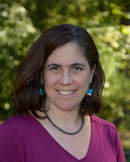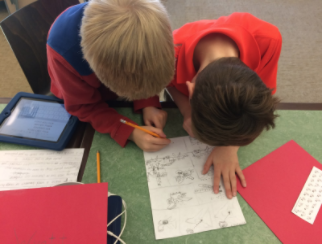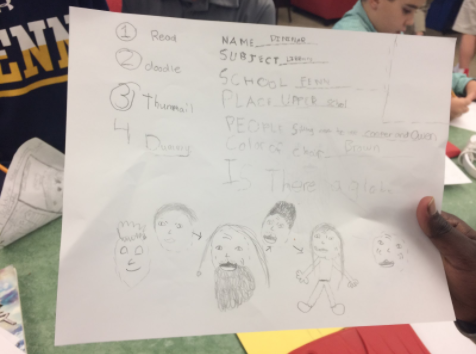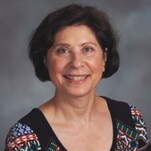| Fenn School Library Liza Halley, Library Teacher Sam Kane, Library Director Teaching graphic novels is a great passion of mine. The following is a brief overview of a graphic novel unit for fourth grade students at the Fenn School in Concord. What follows is an explanation of how the unit was structured, what I learned from the experience and tools you can use if you decide to try something like this in your own library. |
Over the course of the unit, here are some essential questions students considered and answered:
- What can we learn from author interviews?
- How can we take down information from a video?
- What can we learn from author interviews?
- How can we take down information from a Q & A on a Website?
- What elements distinguish a graphic novel as a genre?
- How do we tell stories in the sequential art format?
- KWL. Panels and Story Arcs. Brainstorming our own comics. Reflection.
- A closer look at panels - Independent work examining a selection of books, looking at panels as communication. Work on our own creations. Reflection.
- View Padlet - Author Interviews. Note taking. Work on our own creations. Reflection.
- View Padlet - Author Q & A on Author Websites. Note Taking. Work on our own creations. Reflection.
- Sharing our Creations. Summing up our learning.
Looking back over the unit, I would do almost everything the same way again with next year’s fourth graders. As usual, I wish I had more time each session, especially to be able to share more graphic novel shorts - like the stories in Comic Squad. I had wanted to read aloud the stories on the projector each week and discuss what each artist/writer was doing with panels and their story telling, but we did not have enough time to do that and also accomplish the other goals.
It was so inspiring to see the students’ work and the spark of excitement in their eyes. The boys were allowed to work alone or in pairs to complete a story. I was loose about the finished product - some boys practiced using panels and working on expression and story arcs while others were determined to tell a full story/ The unit allowed me to get to know the boys and their personalities better.
Next time I think I would set some parameters about the stories - for instance, while I said no guns, there was still a fair amount of violence in some of the stories. Like the Comic Squad books, I would pick a theme, like School Recess or Lunchtime and have students try to build a story around that.
It was so inspiring to see the students’ work and the spark of excitement in their eyes. The boys were allowed to work alone or in pairs to complete a story. I was loose about the finished product - some boys practiced using panels and working on expression and story arcs while others were determined to tell a full story/ The unit allowed me to get to know the boys and their personalities better.
Next time I think I would set some parameters about the stories - for instance, while I said no guns, there was still a fair amount of violence in some of the stories. Like the Comic Squad books, I would pick a theme, like School Recess or Lunchtime and have students try to build a story around that.
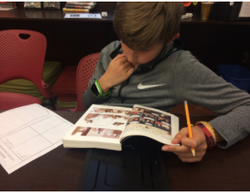 A student examines a graphic novel while planning his own work.
A student examines a graphic novel while planning his own work. Below you will see some letters the students wrote to the students coming in next year. For our early finishers, I had students write letters of advice to future students based on what they learned. This was a nice way for them to synthesize their learning.
Dear Fourth Graders,
Here’s some tips on how to make a good comic book. Add a lot of humor (my comic had some potty humor). Only put in details on one or two people. You always need for other people to understand your setting. Doodle a lot and then pick one of your doodles and turn that picture into a super great story!
Jack P
Dear Fourth Graders,
One tip I would give to you is put some expression in your picture, to make the person look real. Also, make your thought bubble surround what’s happening in it. That is some advice for graphic novels.
Tyler B
Dear Fourth Graders,
READ! That’s the main step. If you read a lot, you can get ideas on stories. Then work on handwriting and pictures. DOODLE. That can make you better at drawings and it could give you ideas.
Liam K
Dear Fourth Graders,
Graphic novels are one of the most fun things in library. Here are some things to keep in mind.
Henry G
Dear Fourth Graders,
Some advice I have for you is think about your favorite things and favorite animals then maybe put them together. Second, read other graphic novels to see what they are like.
Xavi W
Here are the Materials Needed:
Liza Halley is one of the library teachers at the Fenn School, an all boys private school, grades 4 - 9, in Concord, MA. She can be reached at [email protected].
Dear Fourth Graders,
Here’s some tips on how to make a good comic book. Add a lot of humor (my comic had some potty humor). Only put in details on one or two people. You always need for other people to understand your setting. Doodle a lot and then pick one of your doodles and turn that picture into a super great story!
Jack P
Dear Fourth Graders,
One tip I would give to you is put some expression in your picture, to make the person look real. Also, make your thought bubble surround what’s happening in it. That is some advice for graphic novels.
Tyler B
Dear Fourth Graders,
READ! That’s the main step. If you read a lot, you can get ideas on stories. Then work on handwriting and pictures. DOODLE. That can make you better at drawings and it could give you ideas.
Liam K
Dear Fourth Graders,
Graphic novels are one of the most fun things in library. Here are some things to keep in mind.
- Don’t always make panels the same size. Make them bigger or smaller for different things.
- Try to add some funniness in your books. It makes it much better.
Henry G
Dear Fourth Graders,
Some advice I have for you is think about your favorite things and favorite animals then maybe put them together. Second, read other graphic novels to see what they are like.
Xavi W
Here are the Materials Needed:
- Pencils
- A range of panel templates.
- Folders for each student to keep their work in each week.
- Padlet: graphic novelists’ websites with Q & A
- Padlet: online interviews with graphic novelists
- Comic Pages Printable Paper
- Lotsie Tutorial Panel Variations
- Panels as communication
- Google Slideshow created for the entire unit using Slides Carnival
Liza Halley is one of the library teachers at the Fenn School, an all boys private school, grades 4 - 9, in Concord, MA. She can be reached at [email protected].

